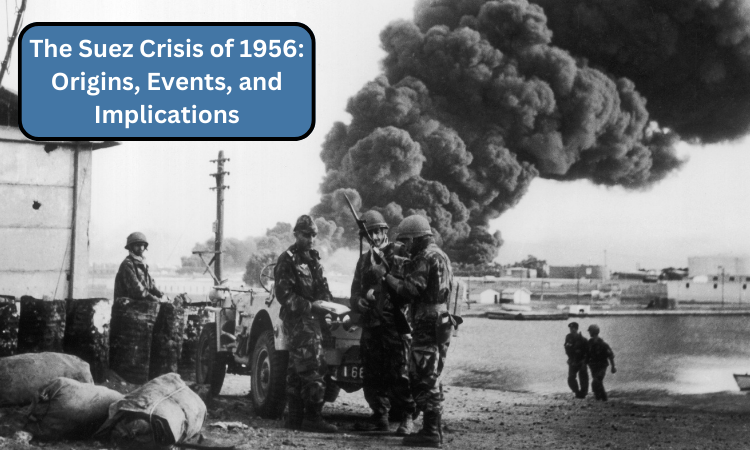
The Suez Crisis of 1956 was a significant turning point in post-World War II geopolitics, highlighting the declining influence of European colonial powers in the face of the emerging superpowers, the United States and the Soviet Union. The crisis revolved around the nationalization of the Suez Canal, a vital waterway connecting the Mediterranean Sea to the Red Sea, by Egyptian President Gamal Abdel Nasser. The ensuing military intervention by Britain, France, and Israel precipitated a political crisis with far-reaching consequences.
The Suez Canal, completed in 1869, was a product of French initiative and British capital. Although geographically located in Egypt, it was internationally managed and primarily controlled by the British and the French. The canal quickly became a symbol of Western imperialism and dominance in the Middle East, as it was vital for European trade and naval power.
By the 1950s, the geopolitical landscape was rapidly changing. The process of decolonization was gathering pace, and Cold War tensions between the U.S. and the USSR were intensifying. Within this context, Egypt, led by the charismatic Gamal Abdel Nasser, sought to break free from Western dominance and assert its national sovereignty.
In 1955, Nasser turned to the West, seeking funds to build the Aswan High Dam, a mega-project aimed at boosting Egypt's economic and agricultural prospects. However, the U.S. and Britain, wary of Nasser's increasingly close ties with the Soviet Union, declined to finance the project.
In retaliation, on July 26, 1956, Nasser announced the nationalization of the Suez Canal, intending to use its revenues to finance the dam's construction. This move was perceived as a direct challenge to British and French interests in the region.
Britain, France, and Israel, each with its motivations, formed a secret alliance to respond to Nasser's nationalization. While Britain and France aimed to reassert their control over the canal, Israel sought to neutralize the military threat posed by Egypt.
The plan was straightforward: Israel would invade the Sinai Peninsula, giving Britain and France a pretext to intervene, supposedly to separate the warring parties and ensure the free passage of ships through the canal.
On October 29, 1956, Israeli forces invaded Sinai. Two days later, Britain and France issued an ultimatum to Egypt and Israel, demanding a ceasefire and withdrawal from the canal area. When Egypt refused, British and French forces began bombing Egyptian positions and subsequently launched a seaborne invasion.
The tripartite aggression was met with widespread international condemnation. Both superpowers, the U.S. and the USSR, denounced the invasion, albeit for different reasons.
The Eisenhower administration, pursuing a policy of anti-colonialism and keen to win the hearts and minds of the newly independent nations, opposed the invasion. The U.S. believed that supporting colonial-era powers would drive neutral countries into the Soviet sphere of influence.
Concurrently, the USSR, despite its ideological support for anti-imperialist movements, was primarily concerned about the possibility of the crisis escalating into a larger conflict, especially given the ongoing Hungarian Revolution.
Faced with immense diplomatic pressure, including threats of economic sanctions from the U.S. and a potential Soviet military intervention, Britain, France, and Israel were forced to withdraw, marking a humiliating setback for the European powers.
Decline of British and French Global Influence: The Suez Crisis marked the end of Britain's role as one of the world's major powers. The inability to act without American support was a clear indicator of Britain's diminished stature on the global stage. Similarly, France realized its limitations, subsequently focusing its energies on consolidating its position within Europe, leading to the formation of the European Economic Community.
Rise of the Superpowers: The crisis affirmed the dominant roles of the U.S. and the USSR in global geopolitics. Their influence in dictating the outcome of the Suez Crisis illustrated their capacity to steer world events.
Assertion of National Sovereignty: The crisis was a victory for anti-imperialist movements. Nasser emerged as a hero in the Arab world and among non-aligned nations. His ability to defy Western powers emboldened other leaders to pursue policies free from colonial-era constraints.
Changing Dynamics in the Middle East: The events of 1956 set the stage for further conflicts in the region. The humiliation of the Suez Crisis, combined with the rise of Arab nationalism, directly contributed to tensions leading up to the Six-Day War in 1967.
The Suez Crisis of 1956 was a watershed moment in post-World War II geopolitics. It demonstrated the declining influence of traditional colonial powers and the rising dominance of the U.S. and the USSR. The crisis reshaped global alliances and set the stage for subsequent events in the tumultuous history of the Middle East. The nationalization of the Suez Canal, and the political drama that unfolded, remains a testament to the complexities of global politics in the 20th century.